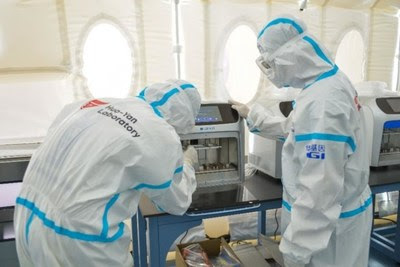Des laboratoires de tests rapides et précis dans les terminaux internationaux offrent une nouvelle solution, alors que les aéroports continuent d’être au cœur de la propagation mondiale du COVID-19.
SHENZHEN, Chine, 4 septembre 2021 /PRNewswire/ — Du mois d’avril au mois d’août 2021, le laboratoire d’analyse du COVID-19 de BGI a aidé 5 500 voyageurs chinois à quitter en toute sécurité l’aéroport international Bole d’Addis-Abeba. En avril, BGI a mis en place le laboratoire « Huo-Yan », un laboratoire de tests COVID-19, à l’aéroport pour les passagers se rendant en Chine, en coopération avec Ethiopia Airlines. Depuis lors, le laboratoire a contribué à ce qu’environ cinq mois consécutifs se passent sans qu’un seul vol soit suspendu sur cette ligne.
Les procédures de test avant le vol mises au point par le laboratoire constituent une option permettant de réduire la contrainte des mesures de confinement à destination.

Le laboratoire fournit aux passagers de l’aéroport des services rapides et précis de tests d’acide nucléique par réaction en chaîne de la polymérase (PCR) et de tests d’anticorps. Le laboratoire peut tester jusqu’à 400 échantillons en trois heures et 5 000 échantillons par jour, ce qui réduit les désagréments pour les voyageurs en partance ou en transit à l’aéroport.
Le laboratoire contribue à réduire les cas importés. Les passagers doivent d’abord se mettre en quarantaine. Ils ne sont pas autorisés à embarquer tant qu’ils n’ont pas obtenu des résultats négatifs à un test PCR d’acide nucléique COVID-19 et à un test d’anticorps.
Depuis le début des opérations du laboratoire, le nombre de cas positifs à l’arrivée a fortement diminué. À ce jour, aucun vol n’a été suspendu entre l’Éthiopie et la Chine, ce qui en fait le seul vol direct du continent africain vers la Chine à avoir fonctionné sans interruption pendant cette période.

« Du 21 avril au 31 août, le laboratoire a fourni des services de test à plus de 5 500 passagers sur 19 vols à destination de la Chine », a déclaré Chen Songheng, le responsable du laboratoire « Huo-Yan » en Éthiopie.
BGI a construit plus de 30 laboratoires « Huo-Yan » avec des partenaires dans plus de 80 pays et régions. En fournissant des solutions à plateforme unique avec des tests précis et efficaces, les laboratoires jouent un rôle essentiel en contribuant à la lutte mondiale contre la pandémie de COVID-19.
BGI est à la pointe du développement de l’innovation dans le domaine de la génomique et des sciences de la vie. Grâce à son modèle intégré, elle intègre le développement industriel, l’éducation et la recherche dans le respect des protocoles bioéthiques internationaux. Elle applique les résultats de la recherche multi-omique de pointe à des domaines tels que la médecine, les soins de santé et la conservation des ressources, et fournit des instruments et des dispositifs exclusifs de pointe dans le domaine des sciences de la vie, ainsi qu’un soutien technique et des solutions pour révolutionner le système de santé actuel vers une médecine et des soins de santé de précision.
Logo – https://mma.prnewswire.com/
